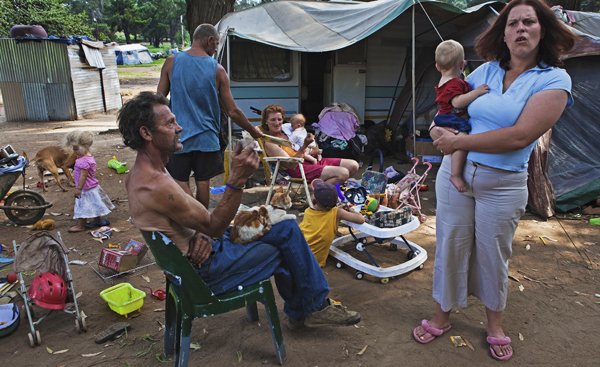Years ago, some feminist on the internet told me I was “Privileged.”
“THE FUCK!?!?” I said.
I came from the kind of Poor that people don’t want to believe still exists in this country. Have you ever spent a frigid northern Illinois winter without heat or running water? I have. At twelve years old, were you making ramen noodles in a coffee maker with water you fetched from a public bathroom? I was. Have you ever lived in a camper year round and used a random relative’s apartment as your mailing address? We did. Did you attend so many different elementary schools that you can only remember a quarter of their names? Welcome to my childhood.
So when that feminist told me I had “white privilege,” I told her that my white skin didn’t do shit to prevent me from experiencing poverty. Then, like any good, educated feminist would, she directed me to Peggy McIntosh’s 1988 now-famous piece, “White Privilege: Unpacking the Invisible Knapsack.”
After one reads McIntosh’s powerful essay, it’s impossible to deny that being born with white skin in America affords people certain unearned privileges in life that people of another skin color simple are not afforded. For example:
- “I can turn on the television or open to the front page of the paper and see people of my race widely represented.”
- “When I am told about our national heritage or about “civilization,” I am shown that people of my color made it what it is.”
- “If a traffic cop pulls me over or if the IRS audits my tax return, I can be sure I haven’t been singled out because of my race.”
- “I can if I wish arrange to be in the company of people of my race most of the time.”
If you read through the rest of the list, you can see how white people and people of color experience the world in two very different ways. BUT LISTEN: This is not said to make white people feel guilty about their privilege. It’s not your fault you were born with white skin and experience these privileges. BUT, whether you realize it or not, you DO benefit from it, and it IS your fault if you don’t maintain awareness of that fact.
I do understand McIntosh’s essay may rub some people the wrong way. There are several points on the list that I felt spoke more to the author’s status as a Middle Class person than a White Person. For example:
- “If I should need to move, I can be pretty sure of renting or purchasing housing in an area, which I can afford and in which I would want to live.”
- “I can be pretty sure that my neighbors in such a location will be neutral or pleasant to me.”
- “I can go shopping alone most of the time, pretty well assured that I will not be followed or harassed.”
- “If I want to, I can be pretty sure of finding a publisher for this piece on white privilege.”
And there are so many more points in the essay where the word “race” could be substituted for the word “class” which would ultimately paint a very different picture. That is why I had such a hard time identifying with this essay for so long. When I first wrote about White Privilege years ago, I demanded to know why this White Woman felt that my experiences were the same as hers when no, my family most certainly could not rent housing “in an area which we could afford and want to live.”
